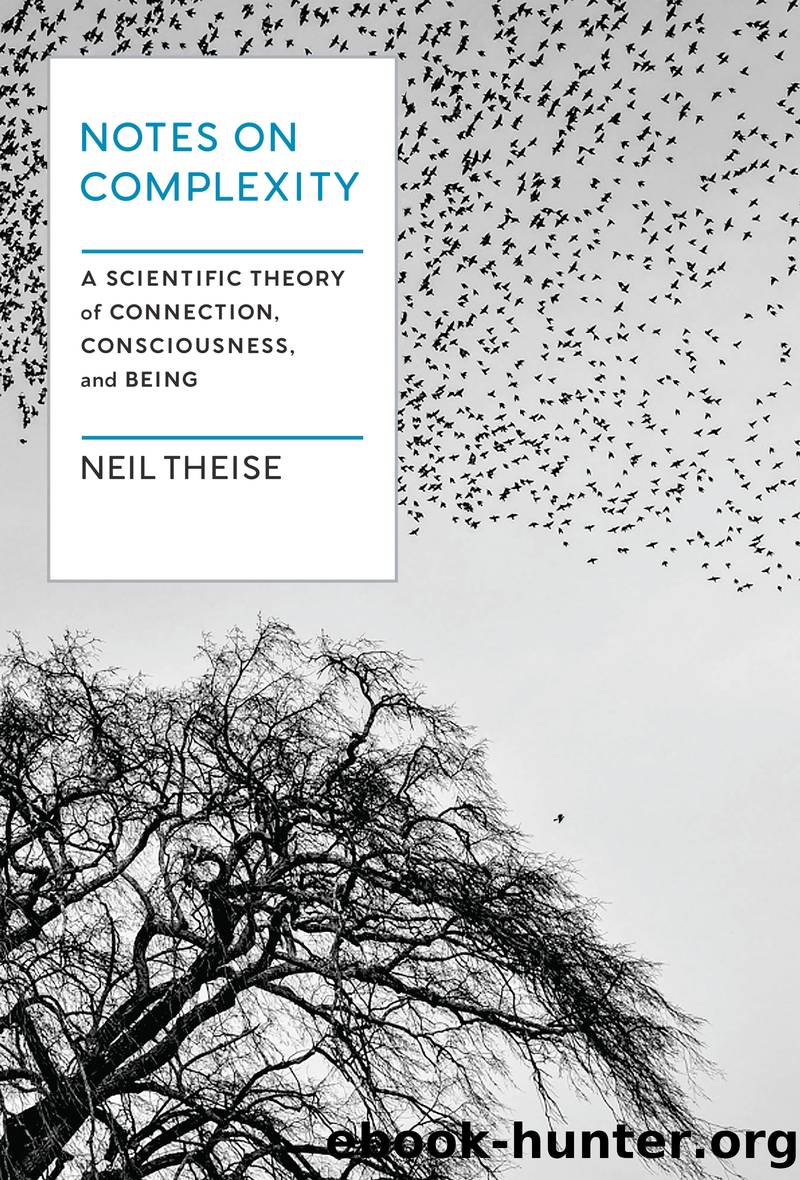Notes on Complexity by Neil Theise

Author:Neil Theise
Language: eng
Format: epub
Tags: General Fiction
Publisher: Spiegel & Grau
Published: 2023-01-24T00:00:00+00:00
Does the Brain Make Consciousness or . . . ?
This paucity of language around consciousness has not prevented the most extravagant explosion in human history of scientific studies on the phenomenon. Every year now, there is a flood of studies taken to support the notion that the brain is the source of consciousness. Evidence comes from fields such as clinical neurology, psychology, and cognitive neuroscience. Advanced technologies such as electroencephalograms (EEG) and functional magnetic resonance imaging (fMRI) allow us to observe the living, actively thinking brain in real time in great physiological detail.
All these physiological data and clinical observations yield what are called neural correlates of consciousness: brain structures and activities that are closely associated with reportable thoughts and perceptions. We know, for example, that when the eye sees images, or even when one merely imagines or dreams specific visual images, the brainâs visual cortex (in the back of the brain) becomes activated. Activation of the visual cortex, therefore, is a neural correlate of consciousness.
We now understand the neurologic processing of vision so precisely that it has become possible to literally âread peopleâs mindsâ by applying advanced brain-measuring technologies. While a subject under study holds an image in their âmindâs eye,â the technology is able to deduce a hazy version of the image just by measuring phenomena in the brain.
While these reports may seem to overwhelmingly support the hypothesis that brain makes mind, do they in fact settle the question? In reality, these examples only demonstrate correlations between specific brain activities and conscious experiences. And correlation, as we might remember from our high school science classes, does not equal causation. Correlations do not prove that the brain activity causes the conscious experience.
You might have noticed that every summer, thereâs a pretty strong correlation between wearing sunglasses and eating ice cream. The two activities seem to go hand in hand quite frequently; indeed, if correlation implied causation, then weâd have to seriously consider whether wearing sunglasses makes people crave ice cream. Or if eating ice cream makes people oversensitive to sunlight and therefore more likely to wear sunglasses. Of course, neither of these conclusions is correct. The reality is that both behaviors are caused by something else entirely: the bright, hot days of summer make people more likely both to wear sunglasses and to eat more ice cream.
Itâs easy to see then how mistaking correlation for causation can quickly lead to some serious errors.
If we are scientifically rigorous and careful not to make such a mistake, however, then we are left with two primary hypotheses to explain the neural correlates of consciousness. The first is that our brains define the activity of our minds. The second is that the contents of our conscious awareness and the correlated activities in our brains derive independently from some other, more fundamental shared root cause, just as summer was the shared cause of both craving ice cream and wearing sunglasses.
To date, there has not been a single experiment out of thousands performed that definitively proves one of these hypotheses over the other.
Download
This site does not store any files on its server. We only index and link to content provided by other sites. Please contact the content providers to delete copyright contents if any and email us, we'll remove relevant links or contents immediately.
Modelling of Convective Heat and Mass Transfer in Rotating Flows by Igor V. Shevchuk(6432)
Weapons of Math Destruction by Cathy O'Neil(6264)
Factfulness: Ten Reasons We're Wrong About the World – and Why Things Are Better Than You Think by Hans Rosling(4731)
A Mind For Numbers: How to Excel at Math and Science (Even If You Flunked Algebra) by Barbara Oakley(3301)
Descartes' Error by Antonio Damasio(3270)
Factfulness_Ten Reasons We're Wrong About the World_and Why Things Are Better Than You Think by Hans Rosling(3230)
TCP IP by Todd Lammle(3180)
Fooled by Randomness: The Hidden Role of Chance in Life and in the Markets by Nassim Nicholas Taleb(3105)
The Tyranny of Metrics by Jerry Z. Muller(3065)
Applied Predictive Modeling by Max Kuhn & Kjell Johnson(3064)
The Book of Numbers by Peter Bentley(2964)
The Great Unknown by Marcus du Sautoy(2690)
Once Upon an Algorithm by Martin Erwig(2641)
Easy Algebra Step-by-Step by Sandra Luna McCune(2628)
Lady Luck by Kristen Ashley(2576)
Police Exams Prep 2018-2019 by Kaplan Test Prep(2540)
Practical Guide To Principal Component Methods in R (Multivariate Analysis Book 2) by Alboukadel Kassambara(2538)
All Things Reconsidered by Bill Thompson III(2389)
Linear Time-Invariant Systems, Behaviors and Modules by Ulrich Oberst & Martin Scheicher & Ingrid Scheicher(2364)
